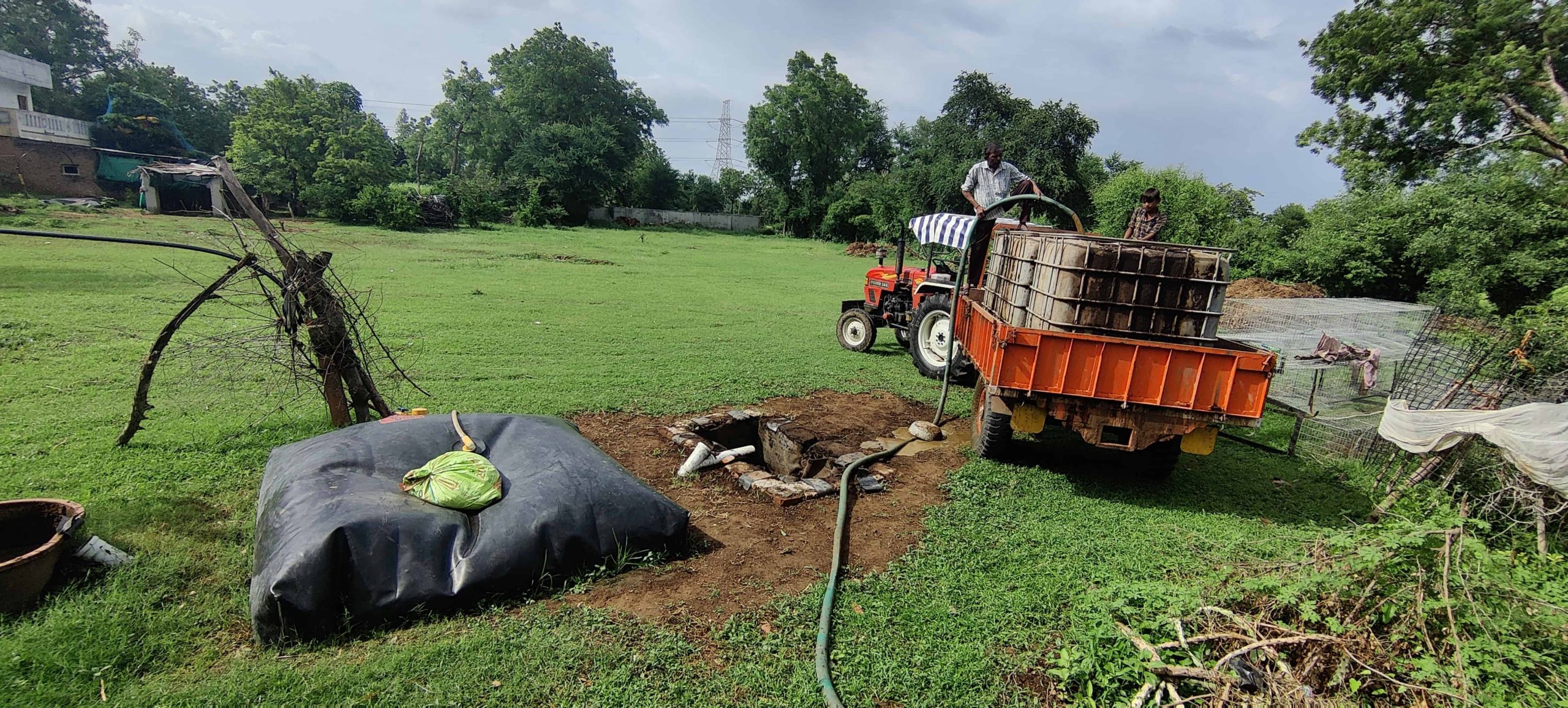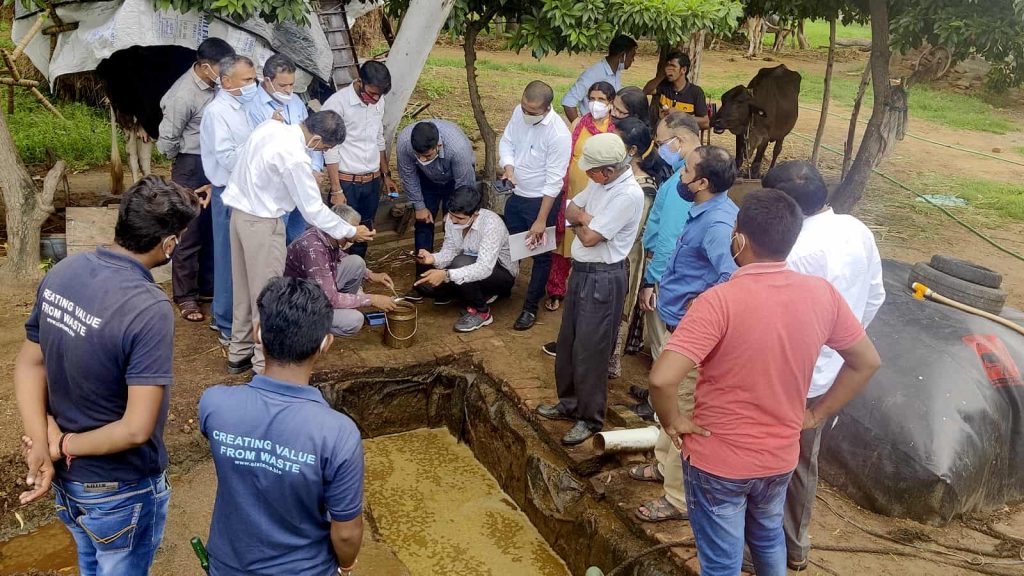About 22% of all anthropogenic greenhouse gas (GHG) emissions are linked to agriculture. To curb global climate change, agriculture worldwide requires a significant reduction in energy consumption, chemical fertilizer use and inefficient waste management practices. Further, inefficient agricultural practices drive land use changes that are a major cause of GHG emissions and deforestation. Smallholder farmers grow approximately 80% of the food consumed in developing economies yet have an acute lack of climate-smart agricultural technologies and training. The majority of rural households still use wood fuel to meet their energy needs, which produces net GHG emissions. Their alternative is to meet their household and farm energy needs with fossil fuels, creating a development pathway for further GHG emissions. Chemical fertilizers and other agricultural inputs emit GHGs through their production, transport and application, locking farmers into a costly and emissions-intensive production cycle. Finally, agricultural wastes and animal manure, managed inefficiently, create significant GHG emissions, while also contaminating local watersheds.
Taken together, climate change, food security and poverty will be the drivers of many other global problems: displacement, conflict, ecosystem loss and many others. Humanity’s ability to address these issues with smallholder farmers go a long way to determine if we are able to address them at all.
As per our internal estimates, about 50% of the dairy farmers have 3-5 cows in Maharashtra and Rajasthan. Improving the productivity of farm animals is one of the major challenges. Efforts with TATA CINI Group have demonstrated great success stories in the states of Gujarat, Rajasthan, Maharashtra and Karnataka. The objective of our partnership with TATA CINI Group is to reduce the barriers of customer adoption and to increase access to biogas technology to the small & marginal farmers.
We introduced our proven Sistema.bio biodigester program with support from Tata Trust and local Gujarat partner CINI. After a successful pilot and scale-up, we ventured into more programs supported by CINI such as CSPC Gujarat, SIED Maharashtra, CMF Rajasthan and Sustain Plus Assam. In collaboration with CINI, we have introduced 250+ families to our biogas product, training and service, and now dozens of biodigesters have been installed with other programs and are running successfully. Till date, these units are providing clean energy services and improving the agricultural productivity of smallholder farmers in Gujarat. This experience has allowed us to also support other projects in Gujarat, and demonstrated the potential to scale the impact of the social enterprise in this region.
Specifically, we will establish multi-stakeholder partnerships with Sustain Plus, the group company of TATA CINI and local dairies supported by the National Dairy Development Board (NDDB) and Bharatiya Agro Industries Foundation (BAIF) to open new awareness, installation and technical bases around the country. These centers will provide information on modern biogas technology to important agricultural and livestock blocks of targeted states.

As a part of Phase 1, the Sistema.bio customer awareness teams, with local support, will scout and install 2,200 biodigesters in 7-8 states which will provide a base for future expansion. Using local marketing activities and demonstration events backed up by local dairies and BAIF staff, the smallholder dairy farmers will receive education about the benefits of biogas technology. With the financial support from Sustain Plus, biodigesters from Sistema.bio will be available on easy terms to the farmer. The farmers that purchase our technology will receive intensive user training and long-term after-sales service. In addition, the Sistema.bio agricultural team will expand the use of biofertilizer produced by dairy farmers, opening up local markets to the use of improved organic production techniques. This will include the improved use of the biofertilizer by Sistema.bio users, and the distribution of biofertilizer to other farmers that can benefit from the organic inputs. This project has an initial timeline of 18 months, with a plan of expanding the work for future years.
We will undertake many local group and solo activities to create awareness and set demand for our biodigesters. We shall start each block by carefully installing 1 demo unit within a group of 20-25 villages and shall reach out to all potential dairy farmers with local dairy support groups in target villages with our information package on clean cooking. Our Field Promoters and local staff will map all the potential customers in target villages and then invite them for a visit to the demo site and let every farmer experience the benefits of clean cooking through biodigesters. We have developed multiple formats of farmer engagement as per discussions with NDDB & BAIF team, where we can talk face to face with the customer and provide answers to all their anxieties and interests. We shall use a full range of marketing collaterals (leaflets, banners, shop boards, wall posters) to make us visible, and make new installations visible to nearby households by putting up a digester board at every installation site. We shall also engage and train hundreds of local volunteers to talk about Sistema.bio digesters and also agree to display banners for promoting our clean cooking mechanism.
Our objectives for the next 18 months are to increase the sales and technical reach of the Sistema.bio India team and promote the technology to a significant number of farmers in 7-8 targeted states of India. Explicitly, we would like to have a last-mile capability to work with hundreds of rural communities to reach at least 2,200 small farmers.
Through promotion, demonstration and below-the-line marketing campaigns in these rural villages, we will empower smallholder farmers to create fertilizer and energy for farms by converting the waste they already have on the farm. In this process we will build an ecosystem of local promoters and partners to further support our efforts to bring clean energy and sustainable agriculture to small dairy farmers. The outcome will include farmers with higher yields, lower costs and lower impact on their local environment and global climate change.
Every year this project will save 152,000 trees to cut, treat approximately 150,000 tons of waste, offset 8132 tons of CO2, and treat 11,900 Ha of land with biofertilizer.
Sistema.bio’s technology and training methodology has proven to be impactful for smallholder farmers in India. With the waste from at least 3-5 cows, an Indian household can meet 80-100% of their household energy needs. This provides important economic and time savings, while also eliminating dangerous indoor air pollution. The success of Sistema.bio digesters in the local community largely depends on successful running of biogas digesters, its promised gas output, training on management and use of biofertilizer. All of these benefits, once realized, will create a positive word of mouth in the local community which will in turn build a sustainable market for biogas.
